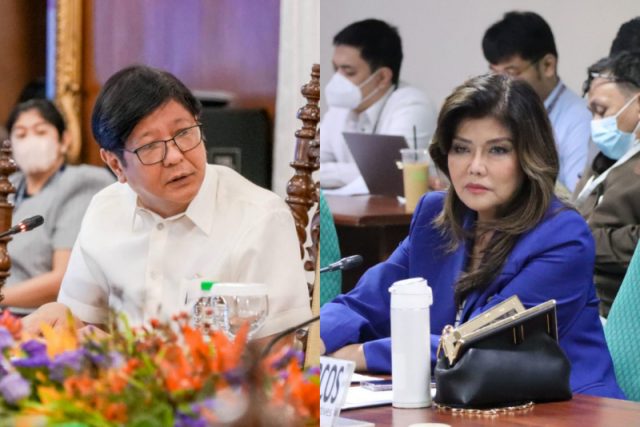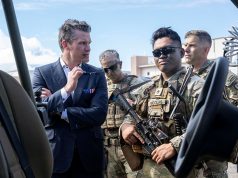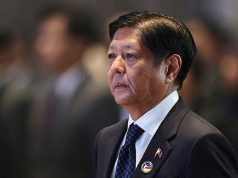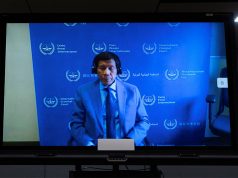
As President Ferdinand “Bongbong” Marcos Jr. pursues his campaign message of “unity,” a few of his policy decisions and expressions have so far contrasted with his older sister’s.
According to historian Ambeth Ocampo, the late dictator Ferdinand Marcos Sr., was said to have a “soft spot for his eldest daughter, the child most likely to succeed.”
This is Maria Imelda Josefa Remedios Romualdez Marcos, also known as Sen. Imee Marcos.
Ocampo in his January 2022 column quoted one of the patriarch’s diary entries about Imee in her younger years, which reportedly reads: “I wish she had been a boy.”
The historian juxtaposed this with Marcos Sr.’s sentiments with his namesake and only son, Bongbong, whom he described as more carefree in his youthful days.
“Imelda feels calamity has befallen us because she cannot control Bongbong who does nothing but play with his friends to the prejudice of his schooling,” Marcos Sr. reportedly wrote on March 15, 1970, when his son was just 12 years old.
“He has lost his star, missed two days homework and stayed up tonight with his two friends,” the patriarch added.
In the end, it was Bongbong who took after Marcos Sr. and became the president of the Philippines, six years after he finished his term as senator.
Bongbong ran under the concept of “unity” or with the aim of uniting the country, especially in terms of recovering from the COVID-19 pandemic.
Imee, meanwhile, is a senator under her brother’s administration. This is her fourth year in Congress’s upper chamber.
Here are some of the instances when the two have clashing beliefs and opinions about some matters concerning policies and public holidays, among others:
37th EDSA Revolution anniversary
Bongbong acknowledged the commemoration of the People Power Revolution‘s 37th anniversary on February 25, Saturday by giving a statement that called for Filipinos to unite to make the country a better place.
“As we look back at this moment in our country’s history, we remind ourselves that despite the polarizing and divisive nature of our politics, it is our capacity for peace, unity, and reconciliation that made us great and worthy of global acclaim as a people,” he said.
“To obtain our aspirations moving forward, we must compose ourselves and appropriate our actions towards settling our differences and identifying collaborative ways to nurture our society,” Bongbong added.
He said that by accepting diversity, Filipinos deepen interpersonal relationships and discover how to make things work “better for all.”
“If we truly stand for democracy, let us face the future by making our sense of community and patriotism the defining cornerstones of our society and the overarching goals of all our efforts in nation-building. I wish everyone a meaningful commemoration,” Bongbong continued.
Imee also released a statement but prior to that, she talked about not having the will to celebrate it.
This was related to her decision to skip the Tan-ok ni Ilocano Festival, Ilocos Norte’s biggest cultural festival, held on February 24 or the eve of the EDSA Revolution anniversary.
Imee spearheaded the festival’s first celebration in 2011 when she was governor of the province.
This year was the first time it was commemorated in person following a three-year hiatus due to the COVID-19 pandemic.
The senator skipped the event but her brother and her son, Ilocos Norte Governor Matthew Marcos Manotoc, were present to celebrate the festival.
“We all know that FEM stadium is very close to my heart, especially our Tan-ok festival, but nevertheless, it seems that fate played a game with us because the celebration coincided with a date that I will never be able to celebrate,” Imee said in a statement on February 24.
FEM stadium refers to the newly refurbished Ferdinand E. Marcos Memorial Stadium in Laoag City.
She said that it is her habit to visit their father’s grave on February 25, where she takes time to “reflect” and “revisit” the past that had changed the fate of her family and the country in 1986.
On the day of the EDSA Revolution anniversary itself, the senator released another statement.
“The events of February 25, 1986 — 37 years ago — changed our minds, hearts, and lives in ways too many to mention,” she said.
“To me, the truth of EDSA is that we owe millions of Filipinos still living [in] squalor and insecurity, ignorance and hunger, the promise of change. Together, as one nation, let us go forth to transform this poor and unjust country into a Philippines that is, truly and finally, for ALL FILIPINOS,” Imee added.
RCEP ratification
Bongbong on February 22 said he is “proud” of the swift ratification of the Regional Comprehensive Economic Partnership (RCEP) in the Senate.
RELATED: Philippines ratifies RCEP trade pact —NEDA chief
Imee, meanwhile, was among those who voted to abstain from the ratification.
The RCEP is a free trade agreement among members of the Association of Southeast Asian Nations (ASEAN) and the countries of Australia, China, Japan, South Korea, and New Zealand.
Agriculture and fisherfolk groups are against the pact as they said it would flood the market with cheap imports at the expense of Filipino farmers and fisherfolk.
“We are proud of the swift ratification of the Regional Comprehensive Economic Partnership Agreement, demonstrating our commitment to openness and a thriving business environment,” Bongbong said before.
“Being part of this regional free trade agreement holds immense potential for promoting economic growth and development across the Asia-Pacific and brings numerous opportunities for our country, particularly in the areas of agriculture, manufacturing, and micro, small, and medium enterprises,” he added.
Imee, on the other hand, said that Filipino farmers should be prioritized.
“Nais ko lang diiinin na ang aking pangangamba ay dulot ng aking paninindigan hindi bilang kapatid sa kapangyarihan kundi bilang anak ng ng legasiya ng aking ama na laging unahin ang maliliit, ang nagsasaka,” she was quoted as saying.
“Ang lupa at ang lahat ng mga nangangailangan. Pahintulutan niyo akong hindi lumahok sa botohang ito, hindi dahil umiiwas sa katungkulan kundi sa panahong ito, bigo pa rin ang nakakarami sa bukid at sa parang,” Bongbong’s older sister added.
Maharlika Wealth Fund
The Maharlika Wealth Fund (MWF) is a sovereign wealth fund that the government will use to invest in a wide range of outlets.
These include foreign currencies, fixed-income instruments, domestic and foreign corporate bonds, commercial real estate, and infrastructure projects, among others.
Bongbong’s economic team believes it would help his administration achieve its “Agenda for Prosperity.”
The president said it would diversify the country’s financial portfolio.
“Such a fund is one tool among many in our efforts to diversify our financial portfolio, which includes our existing institutions pursuing investment that will generate stable returns, but also welfare effects spanning employment creation, improvement of public service, and a decrease in costs of economic activities,” he was quoted as saying.
Bongbong said it would make investments in agriculture, energy, digitalization, and climate change.
Imee, however, was not so keen on the initiative.
As of December last year, the senator opposed MWF’s use of funds from state insurers Social Security System and the Government Service Insurance System.
“Retirement funds should be zero risk. Their values are depleting due to inflation and rising prices, and yet, these will be placed elsewhere?” Imee said.
She added that funds from government financial institutions should be invested in agriculture and energy sectors instead.
“Gamitin sa tamang pamamaraan katulad ng patubig, ‘yung mga dam natin na bulok kaya wala tayong agriculture, at magtataasan ang presyo ng mga imported food. ‘Yung ating kuyente ay lumolobo din,” the senator said.
Imee also argued that investments should only be placed domestically and not in foreign corporate bonds.
Bulacan Ecozone Bill
The Bulacan Ecozone Bill refers to a legislative measure establishing a special economic zone and freeport adjacent to the proposed airport city in the Bulacan province.
It proposes the establishment of the Bulacan Airport City Special Economic Zone and Freeport Authority, which shall manage and operate the Bulacan Ecozone.
Under the bill, foreigners who invest an amount of US $200,000, either in cash or equipment in a registered enterprise, shall be entitled to an investor’s visa.
This was vetoed by Bongbong in July 2022, saying that it poses “substantial fiscal risks to the country” and its “infringement on or conflict with other agencies’ mandates and authorities.”
“At the foreground, fiscal prudence must be exercised, particularly at times when resources are scarce and needs are abundant. While this administration recognizes the objective of the proposed measure to accelerate economic growth in its locality, I cannot support the bill,” he said before.
Bongbong’s sister, however, said she hoped his decision won’t turn off investors.
“Trabaho lang, walang personalan at wala ring kapatiran,” the senator was quoted as saying.
“It is my hope that the veto does not have a chilling effect on the potential local and foreign investors, whom we need now more than ever, as our economy struggles to recover from the pandemic,” Imee added.
She said that they hoped the ecozone would “generate much-needed jobs in Bulacan and the Central Luzon countryside.”
“We need the economic team to tell us what the direction will be regarding the new ecozones so that we are guided. Thereafter, future potential investors can also make up their minds [about] whether we are worthwhile investing in,” Imee said in another report.









